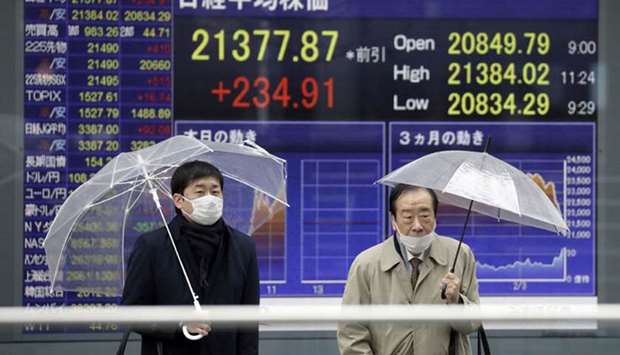The further easing of lockdown measures and signs that economies could be past the worst of the coronavirus crisis kept investors upbeat yesterday, but markets fluctuated on profit-taking and concerns over China-US tensions.
With more countries slowly re-opening their battered economies after months of shutdowns and the backing of trillions of dollars in stimulus and central bank support, global markets have been on a roll for weeks.
And in a sign of the optimism on trading floors, the Nasdaq climbed to within spitting distance of its all-time high, while the S&P is less than 10% short of its own record.
With bars, cafes and popular attractions back up and running across Europe, several countries — including Germany, Italy, Austria and Belgium — began easing border restrictions, fanning hopes for the shattered tourism sector as summer gets underway.
Germany also said it will pump €130bn ($146bn) into a stimulus package to kick-start the region’s biggest economy, and later in the day the European Central Bank is expected to boost its €750bn bond-buying programme by a further €500bn.
Wednesday also saw the release of US data showing another 2.76mn private jobs were lost in May, which was well below the nine million expected by economists, indicating there is light at the end of the tunnel.
“Global equity markets have remained in a buoyant mood fuelled by the prospect of economies reopening while data releases have supported the notion that the worst of the economic downturn could be behind us,” said Rodrigo Catril of National Australia Bank.
Traders were also keeping an eye on the streets of the city on the anniversary of the Tiananmen Square crackdown, which usually draws huge crowds but has been banned this year over virus concerns.
Tokyo’s Nikkei 225 rose 0.4% at 22,695.74 points and Sydney added 0.8% with Seoul up 0.2% and Taipei 0.7% stronger, while Bangkok jumped more than 2%.
Hong Kong rose 0.2% at 24,366.30 points, building on a three-day rally that saw it pile on around 6%. There was also relief there was no trouble during the day on the streets of the city on the anniversary of the Tiananmen Square crackdown, which usually draws huge crowds but was banned this year over virus concerns.
Manila soared more than 4%, taking its seven-day rally to 18%, as lawmakers prepare to push through a $30bn stimulus bill.
Shanghai fell 0.1% at 2,919.25 points and Mumbai was 1% lower, while Singapore and Jakarta were flat.
London, Paris and Frankfurt were slightly lower at the open.
“Investors continue to cling to optimism for a speedy economic recovery from the pandemic and in anticipation of more stimulus from the EU,” said AxiCorp analyst Stephen Innes.
“With economies emerging from lockdown, it seems markets are increasingly confident that the incredulous liquidity injections from central banks and governments alike will continue to flow into risk assets.”
Still, China-US tensions remain on the table, and on Wednesday Washington ordered the suspension of all flights by Chinese airlines in and out of the United States.
But China yesterday said it would allow foreign airlines currently blocked from operating in the country to resume limited flights from June 8, lifting a de facto ban on US carriers.
Despite the continued niggling between the world’s two superpowers, Ken Berman of Gorilla Trades said: “The two sides continue to stick to the ‘phase one’ trade deal, and analysts think that until the two sides... start imposing direct trade measures, the risk to the still-fragile global economy remains low.”
Oil markets slipped back after climbing to three-month highs on hopes for an extension to a massive output cut by major producers led by Saudi Arabia and Russia, who just a few months ago were locked in a market-crashing price war.
Innes added: “The simple fact is that Saudi Arabia and Russia are currently singing from the same song sheet while demonstrating a continued commitment to rebalancing the market and supporting the oil price.
“The critical risk from here will be how US shale producers respond to the rebound in oil prices.”

Pedestrians wait to cross a road in front of an electronic board outside a securities firm in Tokyo. The Nikkei 225 rose 0.4% to close at 22,695.74 points yesterday.
